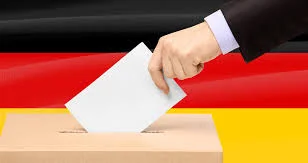Fears on the Right Grow in Germany After French Election By Richard R. Moeller
For the past five years, there has been a mutual appreciation between parties on the Right in Europe. By contrast, Leftist parties throughout Europe have become splintered. This has much to do with the established parties of the Left having become more or less establishment parties especially in western and central European states.
European parties on the Right (in their varying degrees) see themselves as the outsiders - the ones for the forgotten. Various international gatherings between the parties on the European Right have attempted to promote a mutual and singular purpose. This purported connection has not always led to agreement on policy prescriptions or correlation of action. It’s safe to say however, a couple of post-Brexit damaging election results has gotten their attention. What the French did on Sunday, provoked fear within the Right in Europe and especially in Germany.
The Alternative for Germany (Alternative für Deutschland, AfD) is the only populist, rightest, non-regional party in Germany with historical voter success since 1945. Yet its own history is particularly short. The AfD began in 2013 as a Eurosceptic party. It became a full Rightist party in 2015 with the takeover of the party by more conservative members. The leader of the takeover was Frauke Petry. Nevertheless, just last month, Petry let it be known that she will not stand for chancellor representing the AfD in the September Federal election. Now her party wants her out.
Over the past week, the AfD has shown a desire to move even further to the right. Petry had always wanted the AfD to win elections. Her voice has, for all intents and purposes, fallen on deaf ears lately. Perhaps the AfD wants to remain a protest party. The Dutch and French elections might be behind that perception. But both new leaders Alexander Gauland and Alice Weidel have desires on winning.
The AfD is consistently told that no other political parties would join them to form any type of coalition government. If that held true, the AfD would not really have to care about elections all that much. Yet, late last year, the AfD secured about 20 percent of the votes in some of Germany’s state elections.
There was talk that some party would break at some point, join with the AfD, utilize the percentage, and the AfD would be “seen as legitimate.” Yet, the party already has legitimacy – they have seats in regional parliaments. Indeed, the motivation to win elections and form coalitions drove Frauke Petry over the last two years. She even attempted to moderate some of the AfD policies to her demise.
Coalitions are the means for parties to achieve political power and recognition in Germany. Petry knows that and her new replacements Weidel and Gauland know that as well. Rightist populism lost in Austria, The Netherlands, and France. Some now claim Brexit was an anomaly. Still, Germany is structured around percentages. Over 5 percent gets you locked in. That’s good for the AfD. They will most likely be officially represented (albeit alone) in the Bundestag after September.
In the end, however, as voters in Germany see the trend on the continent of stability and not alternatives, the AfD could be whistling past the graveyard. But, they’re not. There is fear in the party, and over the past week, it’s starting to show.
Richard R. Moeller is an Associate Professor of Political Science at The Metropolitan State University of Denver.





